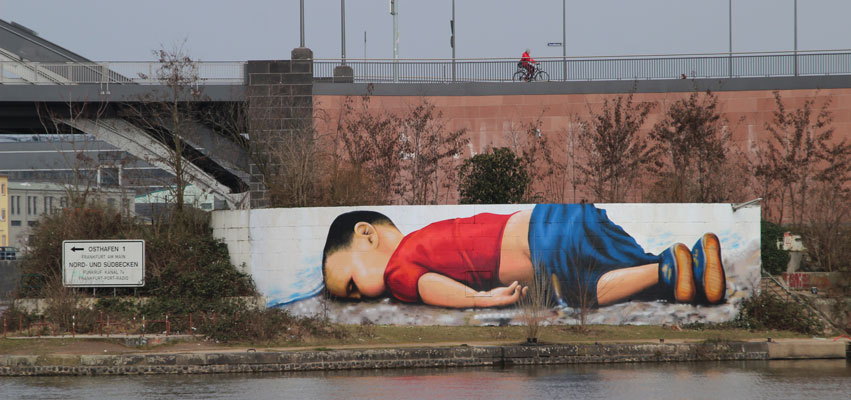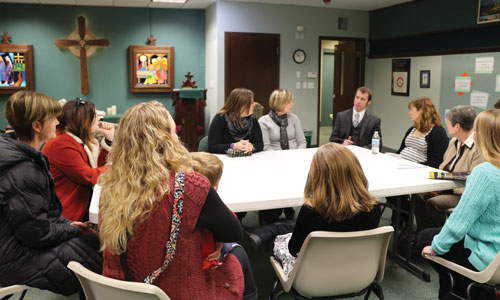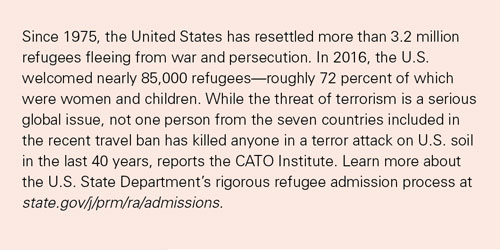
The Peoria Good Neighbor Team seeks to provide refugees with basic relief items, support and shelter.
It all began with a photo. While many of us had felt a stirring deep in our souls as we heard more about what was happening in Syria, it was a photograph that set things in motion. You know the one… the image of little Aylan Kurdi’s body washed up on the shores of the Mediterranean Sea, all dressed for his adventure. If you didn’t know better, you might have thought he had just gotten tired from a day at the beach and had lain down to take a nap.
And the images and stories kept coming: families breaking down in joy after arriving in Greece or being reunited with loved ones. Hospitals bombed. The harrowing escapes—and the stories of those who weren’t as lucky. More stories of death and loss than should ever be accepted.
The Call to Serve
In response to the escalating situation and need for assistance, a small group met at Northminster Presbyterian Church in Peoria. With the support of the pastor and congregation, they collected slightly more than $2,000 in a special offering during Christmas of 2015. This money was sent to Samaritan’s Purse, an international humanitarian aid organization, to assist their efforts in helping the hundreds of thousands of refugees fleeing Syria for safety—leaving everything they know and love behind, hoping for a future for themselves and their children.
Just down the road at United Presbyterian Church, similar conversations were taking place as 40 members gathered to determine how they could be of service. After lengthy discussions, the group decided to help address the short-term need of financial assistance for those working directly with refugees overseas. With strong support from church leaders, the congregation responded to a call to serve as a lifeline for Syrian refugee families, collecting $12,500 for the United Nations’ refugee agency (UNHCR) to provide vulnerable people with basic relief items and shelter as they took the first step on a long journey.
 But neither group wanted to stop there. One collection was not going to make much of a dent in the refugee crises unfolding across the globe. Both groups prayed for a way to help a refugee family come to the United States and adjust to life here. But they were not sure if this was even possible—or how they would go about doing it.
But neither group wanted to stop there. One collection was not going to make much of a dent in the refugee crises unfolding across the globe. Both groups prayed for a way to help a refugee family come to the United States and adjust to life here. But they were not sure if this was even possible—or how they would go about doing it.
The group at Northminster identified World Relief Moline as a potential partner and contacted the agency to see if it was possible for the church to help a family resettle here in Peoria. World Relief, which provides services to refugees and immigrants in western Illinois and  eastern Iowa, taught them about the rigorous process that refugees must go through to be resettled in America. This consists of multiple security checks, interviews, biometrics and medical checks with a range of government intelligence groups, including the FBI, Department of Homeland Security and State Department. World Relief is one of the approved organizations that works with the State Department to resettle refugees who have gone through this extensive approval process.
eastern Iowa, taught them about the rigorous process that refugees must go through to be resettled in America. This consists of multiple security checks, interviews, biometrics and medical checks with a range of government intelligence groups, including the FBI, Department of Homeland Security and State Department. World Relief is one of the approved organizations that works with the State Department to resettle refugees who have gone through this extensive approval process.
Meanwhile, the team from United Presbyterian remained faithful in their prayers and continued the search for an opportunity to help a family locally. The two churches connected in the spring, and after meeting together, realized this was the partnership both had been looking for.
A Good Neighbor Team is Formed
Through their contacts at World Relief, the two groups formally joined into one “Good Neighbor Team.” The team’s responsibility is to gather items to furnish and stock the family’s home, find and set up an apartment, greet the family as they arrive at the airport, assist with immediate transportation needs, provide tutoring and job search assistance, and serve as a friendly resource and support system as they settle into their new lives.
In order to meet all those goals, team members were trained as volunteers for World Relief. They’ve learned more about why people become refugees, and what they endure both before and after resettling. They’ve had background checks themselves, and met other criteria to be volunteers. Once a family is identified, they will receive more specific training on that family’s culture and norms. At the same time, the team has been collecting furniture and home goods for its future neighbors, with the help of many other church members, friends and colleagues.
Many steps are taken to ensure a match that will empower a family in their journey to self-sufficiency and U.S. citizenship. For example, if there is already a network from one country in a particular community, other refugees from that area are likely to be settled there. Likewise, a refugee family with relatives in America will be settled near their relatives.
The Peoria Good Neighbor Team is still awaiting its family match and looks forward to meeting their new neighbors soon. That family could come from any number of countries or cultures. What’s most important is that they find a team of supportive neighbors who will walk beside them first as a support system, and later—when that family has learned a new language and new customs, and even gained employment—as friends. iBi
This article was submitted for publication on January 24, 2017. Three days later, an executive order temporarily banning refugees from seven Muslim-majority nations, including Syria, placed the Peoria Good Neighbor Team’s family match on hold indefinitely.

